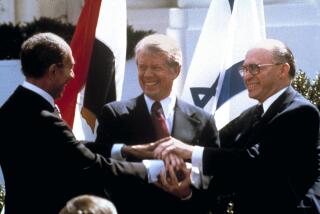Commit Now for the Long Term : Gulf: Our only real military choice is to leave a significant U.S. force in Saudi Arabia, on the Korean model. Otherwise we’ll face a horrific war.
- Share via
The United States has committed forces in Saudi Arabia to stop Iraq’s expansion southward. It has demanded Iraq’s withdrawal from Kuwait. These are big commitments. Where do they lead and how can they be ended?
If our goal is to restore the Kuwaiti emirs to the throne militarily, that will eventually require the defeat of the Iraqi army. Embargoes and diplomatic pressures can hurt Iraq, but they are unlikely to cause Saddam Hussein to capitulate in the short run. Even if he did leave Kuwait, keeping his army intact and prompting our withdrawal, he could move southward again, not stopping until he controls Saudi Arabia and the small gulf states. We could not re-enter in time to stop him. To expel him at that point would require a much more complicated and costly military operation.
In other words, as long as the Iraqi army is whole, and given the unforgivable (in Arab eyes) Saudi act of inviting U.S. troops onto Arab soil, a stable settlement is not possible. We are left with the alternatives of leaving the Saudis to their fate or destroying the Iraqi army. In either case, the aftermath is horrible to contemplate.
Are there other alternatives? Yes, if we limit our military goal to the defense of the Persian Gulf oil-producing states--Saudi Arabia, Oman and the smaller sheikdoms. We would, however, have to leave a militarily significant force, probably an Army corps of two divisions and one or two wings of tactical air, in Saudi Arabia indefinitely--perhaps for decades.
Should we abandon Kuwait to its fate? Putting the emir back on his throne by military means would cost many American lives. Will the American public accept that kind of sacrifice for a regime that is wholly undemocratic? Not for long, or at a high price. Our real interest in the region is not just oil, but political stability. The American public will probably support this dual objective, but that is different from recovering Kuwait by force. Abstaining from attacking Iraqi forces does not have to mean that we accept the Iraqi occupation. We can simply pursue it by other means--economic sanctions, diplomacy, and encouragement of Kuwaiti internal resistance.
President Bush’s policy of defending the Saudis and the smaller states can be sustained. Expelling Iraq from Kuwait by force probably cannot. Moreover, it would pit the United States and a few rich Arab states against the rest of the Arab world. Egypt, Syria, and Morocco cannot remain with us for long in that event.
The unhappy cost of this lesser goal would be an indefinite period of maintaining a large U.S. military force in Saudi Arabia. We have a precedent in Korea. There we fought a bloody war before we established a stable line of defense. In this case, the line is being established without a war and without great loss of American lives. Moreover, our policy has long been to defend these oil producing states. President Carter made it explicit in 1980, and President Reagan reaffirmed it with the creation of the Central Command. The only difference is the source of threat--Iraq, not the Soviet Union.
What about the costs of such a military deployment? Fortunately, the troop reductions in Europe are likely to yield at least a corps of heavy divisions as well as several wings of tactical fighters. Thus we could manage the task just by canceling some Army and Air Force cutbacks. Japan and Western Europe should help defray part of the expense, and Saudi Arabia and its neighbors should also help.
A longer-term advantage might also result from this deployment. The present regimes in the gulf states are under slowly building social pressures to modernize and share political power. A U.S. military presence could moderate this process, making it less likely to lead to the kind of upheaval that occurred in Iran, Iraq and Syria.
This is a precarious time. An outbreak of hostilities that leads to a U.S. offensive into Iraq would take us on a path we may deeply regret treading. Saddam Hussein, of course, could push us onto that path, but that risk is unavoidable. We have much greater control over events if we try to rescue Kuwait diplomatically while militarily defending our friends and an abundant supply of oil. That posture is more difficult for our adversaries to criticize and easier for our allies to support.
Wars have ways of pushing states toward goals they did not intend or think through. We are well advised to think hard about how to control outcomes. Emotional reactions agaisnt Saddam Hussein do not clear our mind in this regard. At the same time, there is no easy exit from the present course.
A decade or more of U.S. military presence in Saudi Arabia may seem intolerable, but are the alternatives more tolerable?
More to Read
Sign up for Essential California
The most important California stories and recommendations in your inbox every morning.
You may occasionally receive promotional content from the Los Angeles Times.













